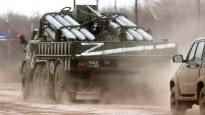Experts interviewed by say Russia wants to discipline Ukraine and teach the West.
Russia’s open declaration of war and large-scale attack on Ukraine are severely shaking the security situation in Europe as a whole.
We asked the program director of the Foreign Policy Institute for estimates Arkady Moshesilta and the Research Director of the Hybrid Competence Center From Hanna Smith.
1. What is Russia aiming for with its military operation?
Arkady Moshes estimates that Russia is seeking to overthrow the current Ukrainian government and possibly try to bring to power a pro-Russian government in Kiev that refuses to seek Ukraine’s membership in NATO and the European Union.
Hanna Smith says Russia wants to punish Ukraine for seceding from Russia.
The Russian elite has believed that Russia has already lost Ukraine, so there is nothing to lose in the military operation. So Russia is now seeking land in Ukraine.
The separatist regions controlled by Russia in eastern Ukraine cover only about a third of the actual Donetsk and Luhansk regions. Expanding these areas may be Russia’s basic goal.
– It may be that your appetite increases when you eat, Smith says.
Arkady Moshes believes that it is no longer possible to evaluate Russia’s decisions as rational solutions. President Vladimir Putin emotional speeches tell him that he wants to teach – not just to Ukraine but to the West.
– It is obvious that Ukraine is only one of the stages in the conflict between Russia and the West.
Moshes estimates that Putin’s main goal is to force the West to accept a new reality: the West must have no political and economic plans in the territory of the former Soviet Union, especially in Ukraine and Belarus.
2. Will Ukraine be able to stop the attack?
Russia has military supremacy in the war. It has more troops, technology and especially air superiority.
Hanna Smith estimates that Ukraine’s chances of resisting the Russian invasion are significantly better than when the conflict began in 2014.
Arkady Moshes estimates that Ukraine started mobilization and calls for reservists too late. On the other hand, Ukraine had a need not to provoke in a difficult situation. In addition, Moshes believes that Ukraine was also late in organizing civil defense. There is a risk that civilian casualties will erode the morale of society.
“If there are mass bombings and heavy casualties among the civilian population, it will also weaken the combat capability of the armed forces,” Moshes estimates.
3. What can the West do?
Hanna Smith says the recognition of separatist areas has not yet been seen as a reason to impose the toughest sanctions. Now the West must be prepared to impose sanctions that will also hit the West’s own economy.
According to Smith, the EU and the US must strike quickly and effectively on where the Russian state gets the money, namely the energy sector. Arkady Moshes agrees.
– The fundamental question is whether to restrict Russia’s energy exports. That’s the main question and it needs to be answered, Moshes says.
According to Smith, sanctions must now also be imposed on President Putin and the Russian elite as a whole.
Concrete aid must also be sent to Ukraine: humanitarian, financial and military equipment.
Moshes says sanctions and their threat affect people who make rational decisions. The problem now is that the Russian leadership is not acting rationally, so it is difficult to influence it with sanctions. The Russian leadership seems to have lowered that tough sanctions will not come or can be overcome.
4. How does the war affect the security of Finland and the Baltic Sea region?
Arkady Moshes believes there is no immediate effect. In the future, the war in Ukraine may also be reflected in the security situation in the Baltic Sea region.
Hanna Smith says that the war will have a significant detrimental effect on the security situation in the Baltic Sea region and Finland.
Putin has cited Russia’s inability to allow NATO as the main reason for the war.
According to Smith, this also involves states that are not in NATO and could consider joining NATO. According to Smith, events must be taken into account in Finland and Sweden.
– Now Russia has shown that anything is possible. The longer the war in Europe, the more impact it will have elsewhere, Smith says.
5. How do ordinary Russians react to this operation?
Hanna Smith estimates that the war has shaken the views of even Putin’s supporters. The Russians generally do not want war.
“This may be the beginning of the end for Putin’s regime, although not in the short term,” says Hanna Smith.
The Kremlin, on the other hand, has not even attempted to raise widespread acceptance of the recognition of so-called “people’s republics.”
Arkady Moshes estimates that a mobilization similar to the nationalist wave raised by the Crimean occupation is not expected now.
How should Finland and others support Ukraine? You will be able to discuss this topic until Friday, February 25 at 11 p.m.
